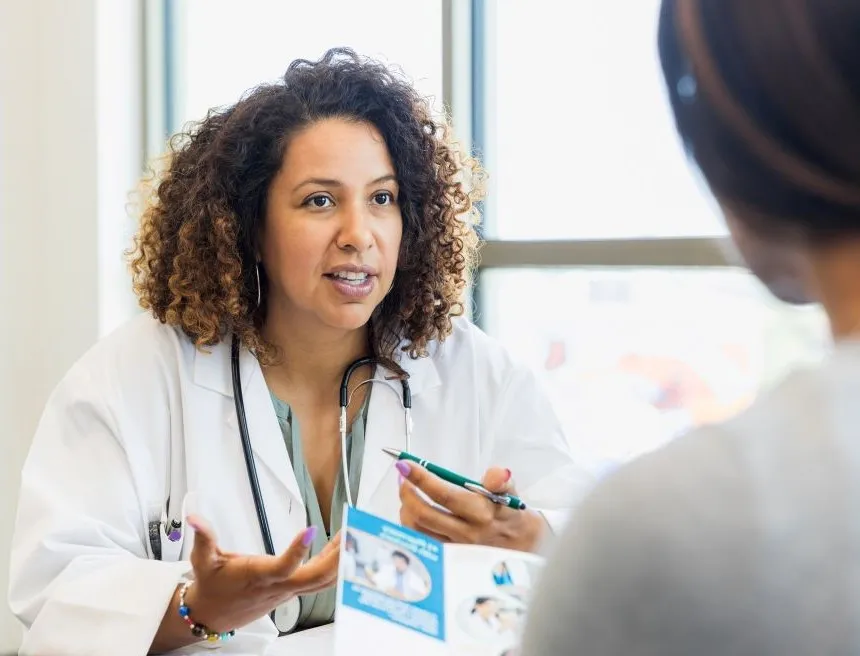Making Hard Decisions About Breast Cancer Surgery & Reconstruction

Stock photo posed by models, sourced from Getty Images
Treatment decisions like surgery, including whether to undergo breast reconstruction after treatment for breast cancer, can be overwhelming. Here are some helpful things to consider as you think about what’s right for you.
Receiving a cancer diagnosis is never easy, but it becomes even more complicated when you face difficult decisions about your treatment, which may include surgery. Many people with breast cancer will have some type of surgery as part of their treatment.
If your doctor recommends surgery (breast-conserving surgery or a mastectomy) to remove the cancer, you might worry about the long-term physical changes and how it will impact the way you view your body. Your doctor may discuss breast reconstruction as an option to rebuild the shape and look of your breast after surgical treatment.
If you are thinking about having reconstruction, you may have searched for information online and discovered a variety of opinions about it. This can make it hard to determine what's best for you. Treatment decisions, like surgery, are difficult and can be overwhelming both physically and emotionally.
Remember: You are not alone and have a team of healthcare professionals, caregivers, friends, and other loved ones who can support you.
Here are a few helpful tips and resources to keep in mind:
Take Ownership of Your Diagnosis
Choosing to have breast reconstruction surgery is a very personal decision. As difficult as it is, this is your experience. Learn to speak up for yourself. Become comfortable asking friends and family for help when you need it, especially because they likely want to do whatever they can to help you.
It's also important to have honest conversations with your care team. Make sure you express any concerns you have about reconstruction surgery or any of the alternatives. These include choosing not to replace the removed breast(s) or using a breast form, a type of prosthesis (artificial body part) that can be worn inside a bra. Talk to your healthcare team about finding a specialty store that can help you make a selection that's right for you.
Tip: Don't be afraid to talk to your healthcare team about any questions or worries you have, but also remember that this is your body and your decision. If you feel rushed or don’t think you are being heard, seek a second or even third opinion.
Think About What's Important to You
As you consider whether breast reconstruction may be right for you, think about factors such as:
- Your feelings and emotions – How will the loss of a breast affect the way you view your body or sexual identity?
- Potential scarring – Will scars beyond the breast bother you?
- The recovery process – How will your lifestyle be affected as you recover?
- Future surgery – It's possible that reconstruction surgery may be needed in the future to correct for physical changes.
As you think about what's important to you, remember that it’s OK if you choose not to undergo reconstruction. Many people who decide not to have reconstruction embrace this decision and feel empowered about their body and their choice.
Tip: Ask your plastic surgeon to connect you with at least one former patient who has had the same reconstruction procedure you are considering. Most plastic surgeons will have pictures for you to look at and former patients who would be willing to talk with you about reconstruction.
If You Choose to Pursue Surgery, Stay Comfortable After the Procedure
Wear clothes that are easy to take on and off like button-down shirts and pajamas, as well as slip-on shoes with a rubber sole that will be more comfortable. Use extra pillows for comfort and apply a moisturizer cream like shea or coco butter for dry skin.
Tip: Talk with your healthcare team about when you can resume activity. When you get the “all clear,” try one of our free, guided fitness classes to keep you moving & breathing. You’ll find yoga lessons, gentle exercises, and meditation videos specifically designed with the needs of people impacted by cancer in mind.
Seek Support
Breast surgery can be difficult physically and emotionally, but finding support can help you cope with feelings of loss, grief, and change after your procedure. There are many places to turn for practical and emotional support.
Check with your healthcare facility to see if they can connect you to a patient or nurse navigator or oncology social worker. These team members can help you cope with any physical changes and side effects long after surgery.
Attending a cancer support group, virtually or in person, can also be an effective way to cope. Support groups offer a place where you can talk about what you are experiencing with others who are going through similar experiences. You might also learn about coping strategies that have helped other group participants. In these ways, connecting with others who understand can improve your ability to cope and provide a sense of security and well-being.
Read More: Is a Support Group Right for You?
Creating a new normal around your cancer diagnosis and life post-surgery will help you feel like you have more control over your situation. Try to relax as much as possible, surround yourself with a support team, and seek out resources that can help you. Take everything one step at a time.
Every woman is different. Every woman will make the right decision for herself.
Read Lyn's Story: Living Fully After Breast Cancer & Mastectomy